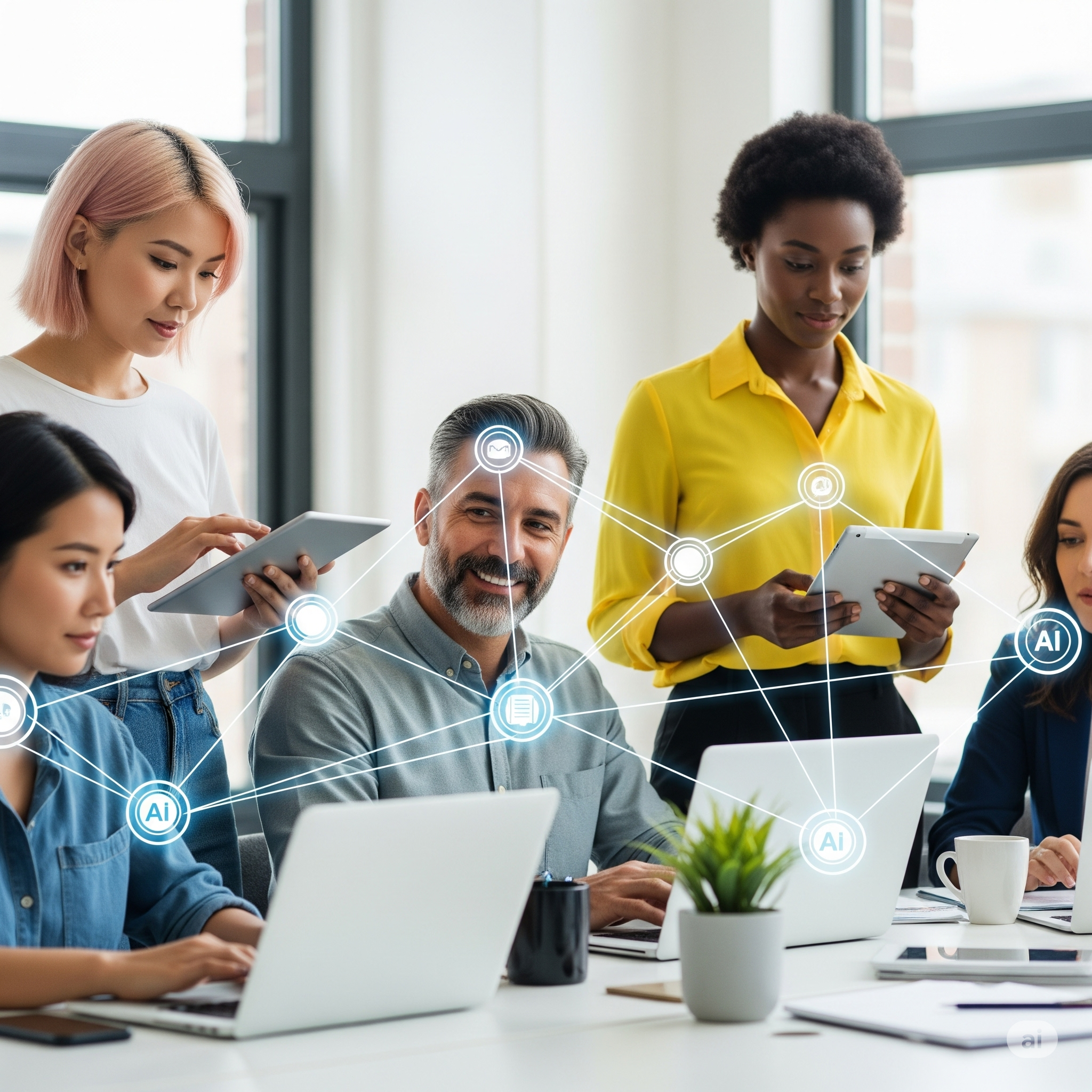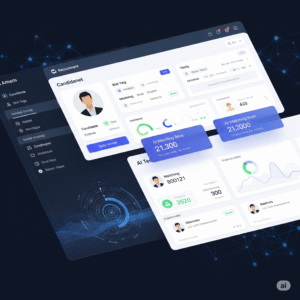The modern workplace is rapidly evolving, driven by a fundamental shift in how organizations view their most valuable asset: their people. Beyond simply managing human capital, companies are now laser-focused on creating an exceptional AI employee experience. This holistic approach encompasses every interaction an employee has with their organization, from the very first touchpoint during recruitment to their growth, development, and eventual departure. And at the heart of this evolution lies Artificial Intelligence.
AI employee experience is no longer a futuristic concept; it’s a powerful reality reshaping how businesses foster engagement, personalize journeys, and ultimately, build a thriving workforce. By leveraging intelligent systems, companies can move beyond one-size-fits-all strategies, delivering tailored support and opportunities that resonate with individual needs and aspirations. This comprehensive guide will explore how HR AI solutions are transforming the employee journey, making it more efficient, engaging, and personal than ever before.
Redefining the Welcome: AI in Onboarding
The onboarding process sets the tone for a new employee’s entire tenure. A well-executed onboarding can significantly impact retention, productivity, and overall job satisfaction. Traditionally, this process has been manual, generic, and often overwhelming. However, AI employee experience is revolutionizing onboarding, making it personalized, proactive, and seamless.
Personalized Onboarding Journeys
Imagine a new hire joining your company, and instead of a generic welcome packet, they receive a tailored onboarding plan that anticipates their needs and aligns with their specific role. HR AI solutions make this a reality. By analyzing a new employee’s profile, department, and even their pre-hire interactions, AI can curate relevant information, assign necessary training modules, and suggest connections with colleagues or mentors. This ensures new hires get the right information at the right time, minimizing confusion and accelerating their integration into the team.
For instance, an AI employee experience platform can automatically enroll a new marketing specialist in relevant product training, provide links to departmental resources, and even suggest informal coffee chats with key team members based on their roles. This proactive and personalized approach helps new employees feel valued and supported from day one.
AI-Powered Onboarding Assistants
Chatbots and virtual assistants powered by HR AI solutions are increasingly becoming the first point of contact for new hires. These intelligent assistants can answer common questions about benefits, company policies, IT setup, and office procedures instantly, 24/7. This frees up HR teams from repetitive administrative queries, allowing them to focus on more complex, high-touch interactions that require human empathy and problem-solving. A recent study highlighted that companies using AI in onboarding reported significant reductions in administrative burden and improved new hire satisfaction.
Nurturing Growth: AI in Learning and Development
Beyond onboarding, continuous learning and professional development are crucial for retaining top talent and fostering a skilled workforce. AI employee experience is fundamentally transforming how organizations deliver training, identify skill gaps, and enable employees to pursue meaningful career paths.
Adaptive Learning Paths and Skill Gap Analysis
Every employee has a unique learning style and a distinct set of skills. Generic training programs often fall short. HR AI solutions analyze an employee’s performance data, career aspirations, and even industry trends to recommend highly personalized learning paths. If an employee struggles with a particular concept, the AI can suggest alternative learning resources or different formats. Conversely, if they demonstrate mastery, the system can accelerate them to more advanced topics. This adaptive learning ensures maximum engagement and knowledge retention.
Furthermore, AI employee experience platforms can perform continuous skill gap analysis. By comparing an employee’s current skills against the evolving requirements of their role or future desired roles, AI can proactively identify areas where upskilling or reskilling is needed. This allows HR and managers to implement targeted training initiatives, ensuring the workforce remains relevant and competitive.
Content Curation and Recommendation Engines
The sheer volume of online learning content can be overwhelming. HR AI solutions can act as intelligent content curators, sifting through vast libraries of courses, articles, videos, and internal resources to recommend the most relevant and impactful content for individual employees. These AI-powered recommendation engines learn from an employee’s preferences, learning history, and peer activities, providing a highly personalized and effective learning experience. This makes learning more accessible and ensures employees are always developing the skills most beneficial to their career growth and the organization’s needs.
Fostering Engagement and Well-being: AI for the Daily Grind
A positive employee experience isn’t just about big moments like onboarding or promotions; it’s about the day-to-day interactions and the overall work environment. HR AI solutions are making significant strides in enhancing daily workflows, promoting well-being, and boosting overall employee engagement.
Intelligent Self-Service and Support
Employees often spend valuable time searching for information or waiting for HR to respond to routine queries. AI employee experience platforms offer intelligent self-service portals and chatbots that provide instant answers to a wide range of questions, from payroll inquiries to IT troubleshooting. These AI assistants learn from interactions, becoming more accurate and efficient over time. This not only empowers employees to find solutions independently but also significantly reduces the administrative burden on HR and IT support teams.
Consider a scenario where an employee needs to understand a specific aspect of their health insurance plan. Instead of calling HR and waiting for a response, they can simply type their question into an HR AI solutions chatbot and receive an immediate, accurate explanation tailored to their policy.
Predictive Analytics for Employee Well-being and Engagement
One of the most powerful applications of AI employee experience is its ability to analyze various data points to predict potential issues like burnout, disengagement, or attrition. By analyzing anonymized data from internal surveys, communication patterns, work-life balance indicators, and performance trends, AI can identify subtle warning signs. This allows HR and managers to intervene proactively with personalized support, wellness programs, or workload adjustments before problems escalate.
For example, an HR AI solutions platform might flag an employee showing increased late-night activity, decreased engagement in team communication, or a sudden dip in performance. This early warning enables a manager to check in, offer support, or adjust priorities, potentially preventing burnout and improving overall well-being. This proactive approach underscores how businesses use AI to turn data into crucial decisions and profit, by retaining valuable talent.
Case Studies: AI in Action for Employee Experience
Let’s look at how leading companies are leveraging AI employee experience to make a tangible difference.
Case Study 1: Shell’s Global HR Support with AI Chatbots
Shell, the global energy company, faced a massive challenge with employee queries, especially across diverse geographical locations and time zones. Their HR service desk was often overwhelmed, leading to delays and employee frustration. They implemented an AI employee experience chatbot, integrated with their HR systems, to provide immediate answers to a wide range of HR-related questions.
This HR AI solution allowed employees to get real-time information on topics like leave policies, benefits, and internal procedures without waiting for a human HR representative. The AI learned from each interaction, continuously improving its accuracy and scope. As a result, Shell reported a significant reduction in HR service desk tickets, freeing up HR professionals to focus on more complex, strategic human capital initiatives. This not only improved employee satisfaction by providing instant support but also led to substantial operational cost savings, demonstrating how intelligent HR AI solutions can directly impact a company’s bottom line.
Case Study 2: Deloitte’s AI-Driven Talent Optimization
Deloitte, a multinational professional services network, has been a pioneer in using AI employee experience for talent optimization and retention. Facing the challenge of high attrition in certain key roles, Deloitte developed internal AI models to predict flight risk among employees. These models analyze a multitude of factors, including project assignments, promotion history, compensation, and engagement survey data.
The HR AI solutions provided actionable insights to managers and HR business partners, allowing them to proactively intervene with personalized retention strategies such as tailored career development opportunities, mentorship programs, or adjustments to work arrangements. This data-driven approach, powered by AI employee experience, significantly improved retention rates for critical talent, reducing the substantial costs associated with recruitment and onboarding new employees. By turning internal data into predictive insights, Deloitte effectively leveraged AI for business intelligence to secure its talent pipeline and enhance its competitive edge.
Enhancing Retention: AI as a Predictive Partner
Employee retention is a critical metric for any organization, impacting everything from productivity and morale to financial performance. AI employee experience is providing HR teams with unprecedented capabilities to predict attrition and implement proactive retention strategies.
Predictive Attrition Models
One of the most impactful applications of HR AI solutions is the development of predictive attrition models. These models analyze historical data, including employee demographics, performance reviews, compensation changes, engagement survey results, and even external market conditions, to identify patterns that precede an employee’s decision to leave. The AI can then flag individuals or groups at higher risk of attrition, allowing HR and managers to intervene with targeted support. This proactive approach is far more effective and cost-efficient than reacting to resignations after they occur.
Personalized Retention Strategies
Once a potential flight risk is identified by AI employee experience tools, the insights gained can be used to craft personalized retention strategies. This might involve:
- Tailored Development Opportunities: Offering specific training or project assignments that align with an employee’s career aspirations.
- Proactive Recognition: Ensuring valuable contributions are acknowledged and rewarded in ways that resonate with the individual.
- Work-Life Balance Adjustments: Addressing concerns about workload or flexibility before they become critical.
- Mentorship and Coaching: Connecting employees with mentors or coaches who can provide guidance and support.
These individualized approaches, informed by HR AI solutions, demonstrate a genuine commitment to employee well-being and career growth, significantly increasing the likelihood of retention.
Key AI Tools for a Superior Employee Experience
For organizations looking to invest in AI employee experience, a range of powerful tools and platforms can help:
- Moveworks: An AI-powered employee experience platform that automates resolution of employee questions and IT issues through conversational AI, integrated with existing HR and IT systems.
- Leena AI: Offers an AI-powered virtual assistant for HR, automating employee support for common queries, onboarding, and internal communications, aiming to deliver a seamless AI employee experience.
- Gloat: An AI-powered internal talent marketplace that connects employees with personalized career opportunities, projects, and mentorships within the organization, fostering internal mobility and development.
- Eightfold AI: A talent intelligence platform that leverages AI to help organizations hire, retain, and develop their workforce by matching skills to opportunities, enhancing the entire AI employee experience lifecycle.
- Culture Amp: While not exclusively AI, this employee experience platform incorporates AI and machine learning for analyzing employee feedback and sentiment, providing actionable insights to improve engagement and retention.
Implementing AI for Employee Experience: Best Practices
Integrating AI employee experience solutions requires careful planning and a human-centric approach.
- Define Clear Goals: Start by identifying specific challenges you want to solve or improvements you want to make in your employee experience. Is it faster onboarding, reduced attrition, or improved employee engagement? Clear goals will guide your AI implementation strategy.
- Ensure Data Privacy and Ethics: AI thrives on data, but employee data is sensitive. Establish robust data privacy protocols and ensure ethical guidelines are in place for how AI analyzes and uses employee information. Transparency with employees about AI’s role is crucial for building trust. A report by McKinsey emphasizes the importance of a human-centric approach to AI in HR, focusing on trust and ethical considerations.
- Start Small, Scale Smart: Begin with a pilot program in a specific area (e.g., onboarding chatbots for a single department) to test the HR AI solutions and gather feedback. Learn from these initial experiences before scaling across the organization.
- Empower HR Professionals: AI isn’t meant to replace HR; it’s designed to empower them. Train your HR team on how to leverage AI employee experience tools, interpret data insights, and focus on the strategic, human-centric aspects of their roles. Tools like Zapier can help HR teams automate routine tasks, allowing them to focus on high-value activities.
- Maintain the Human Touch: While HR AI solutions automate and personalize, the human element remains paramount. AI should augment, not replace, human empathy, coaching, and personal connections. Ensure there are always avenues for employees to connect with human HR professionals when needed.
- Measure and Iterate: Continuously measure the impact of your AI employee experience initiatives on key metrics like employee satisfaction, retention rates, time-to-productivity, and engagement scores. Use these insights to refine your AI strategies and ensure ongoing improvement.
The Symbiotic Future: AI and the Human Touch
The future of the employee experience is undeniably intelligent. AI employee experience and HR AI solutions are transforming how organizations attract, nurture, and retain their talent, moving towards a highly personalized and efficient approach. By freeing up HR professionals from administrative burdens and providing data-driven insights, AI empowers them to become more strategic, empathetic, and impactful leaders within their organizations. The synergy between human ingenuity and artificial intelligence promises a workplace where every employee feels understood, valued, and empowered to thrive.
The Future of AI Recruitment Software: Automating Sourcing and Candidate Screening for Top Talent
The Future of AI in HR: Recruitment, Training, and Employee Experience



